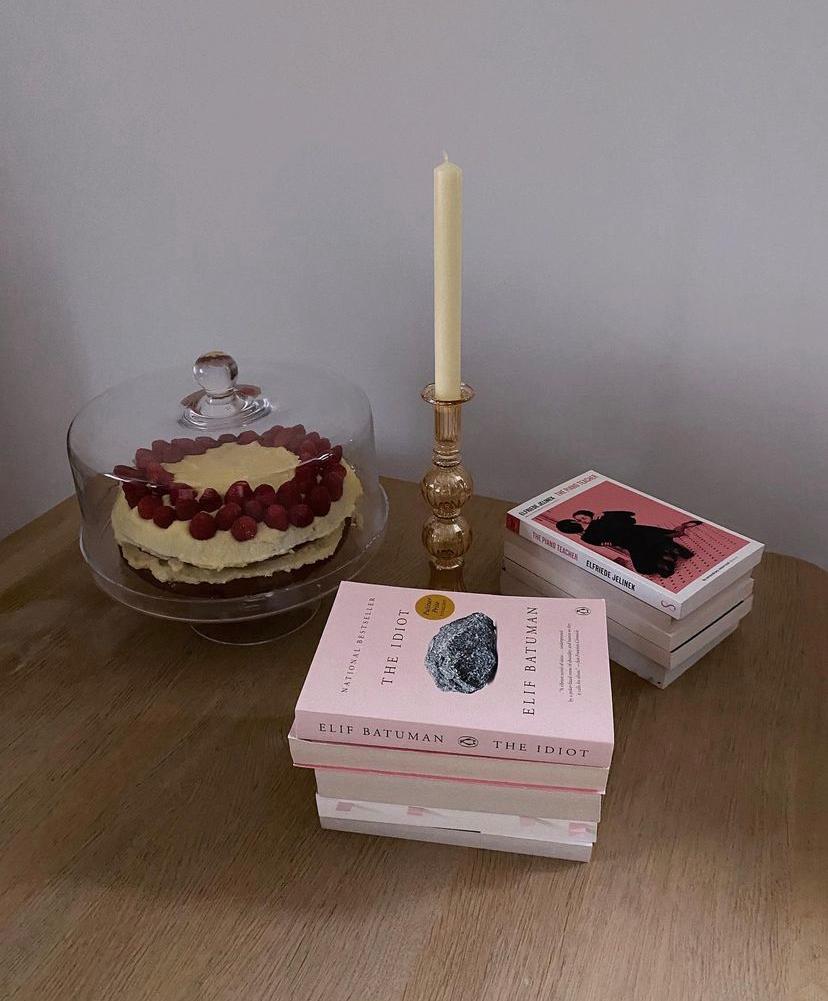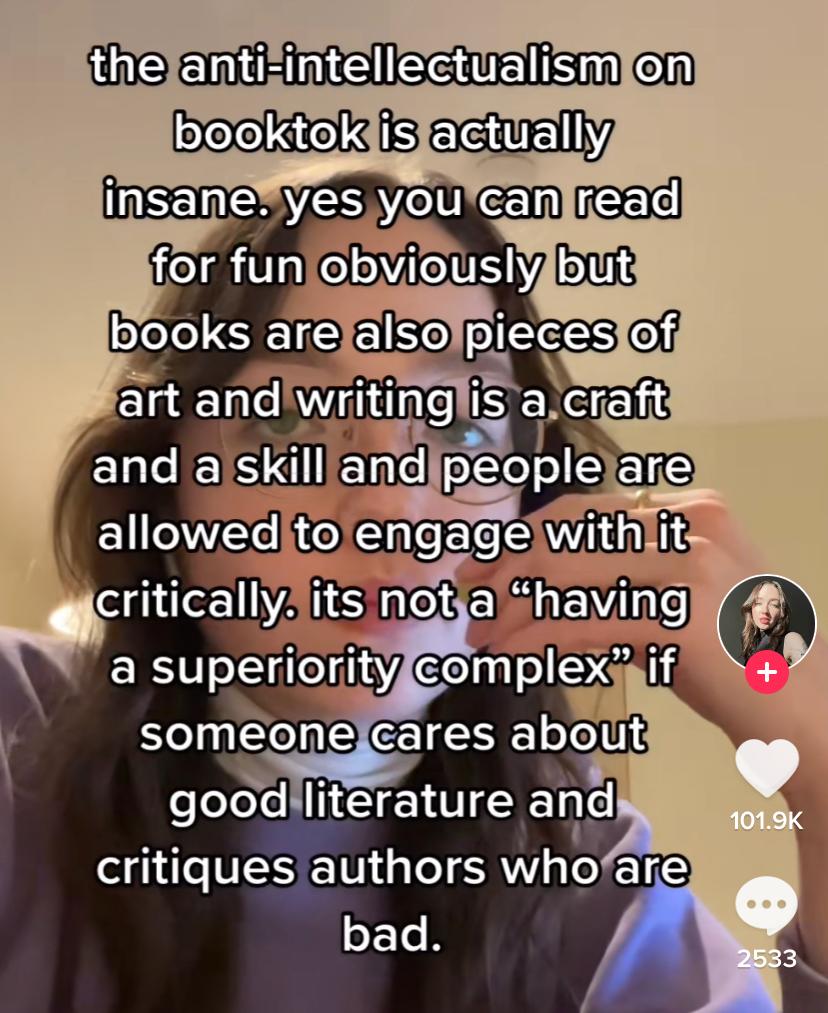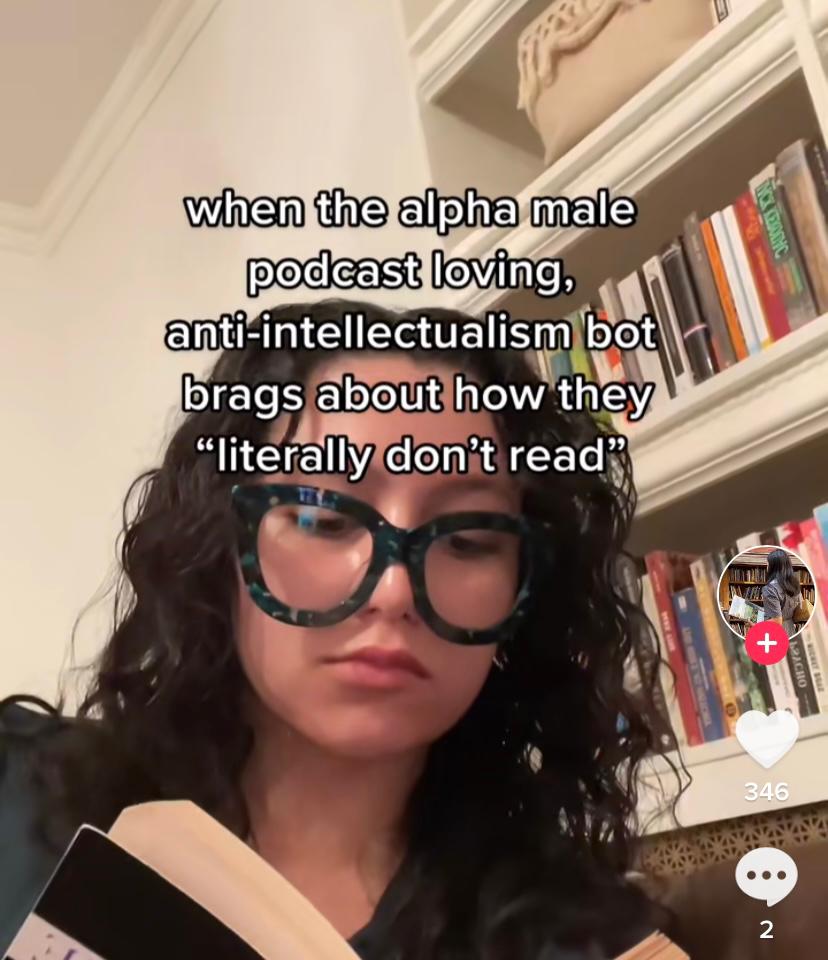by Charlie Fabre
One of the great things about the modern literary canon is just how vast and open the horizon is: there is a book out there for everyone. With the booming success of ‘Bookstagram’ and ‘BookTok’, reading is becoming more and more accessible which is a real success. Half the joy of reading and writing comes from the ability to share with others.
This resurgence of reading as a hobby and a trend is in part due to the lockdowns caused by Covid-19. With nowhere to go, no work to be done, no people to see, many of us had nothing better to do than pick up the forgotten childhood hobby and read a book. The pandemic was a boon to the industry as many of us rediscovered our love of fictional worlds and the escapism they provide.
Recently however there has been discourse on TikTok and Instagram on the merits of reading certain books vs. others. The topic primarily started when Colleen Hoover became a ‘must-read’ name on BookTok. Scrolling through BookTok in 2022 was virtually impossible without bumping into some kind of recommendation list that included It Ends With Us or Ugly Love. But with the rise of Colleen Hoover and her ilk has also come the rise of a movement termed Anti-Intellectualism.

Many bookish creators have taken to their platforms to discuss what they consider a very concerning trend. Of course, there are many roots that have lead to this rise of Anti-Intellectualism: the common banning of books in certain institutions, popular billionaires and “self-made” business bros claiming that they don’t read and encouraging others to follow this path, and of course the increasing saturation of the market with authors like Colleen Hoover (I will expand on this further). These roots have traced the road to the same destination however, and that is that reading doesn’t need to be, and perhaps even shouldn’t be, a critical or intellectual experience. Some have taken it a step further and claim that reading and writing books has no merit at all in fact.
What is Anti-Intellectualism? It is the shunning or conscious elimination of consuming media with a purpose and/or in search of meaning. It is when reading with a critical lens, to provoke thought, is called stupid or a waste of time. It is when breakthrough books are being banned for daring to challenge norms, it is when questions are silenced because they may threaten the current powers. Anti-Intellectualism is the current insistence on reading as being purely a hobby, purely an act of leisure which does not require thought, when really, reading, as with the consumption of all art, is meant to be an exercise in critical analysis.

tiktok by @withleia
First off, I’d like to state that what you read and how you read it is completely up to you and valid whether it’s reading a fun summer romance just for the vibes or reading a piece of complex theory to further a personal project.
Secondly, the reason I keep citing Colleen Hoover as an example is partly because she’s a well-known and very popularized name who writes what is considered ‘low-brow’ literature in the bookish community, but I could just as easily cite another well-known and popularized author who writes the same stuff. This isn’t by any means a dig at Miss Hoover, or at anyone who reads and enjoys her work. However, the other reason for targeting Colleen Hoover is because while she obviously writes engaging stories, her writing on a technical level has little merit compared to say other contemporary authors like Hilary Mantel or Elena Ferrante, and it is clear that she has not taken the time to intellectualize some of the more serious topics she discusses in her fiction.
Regardless, this piece is not a critique of Colleen Hoover’s work or anyone’s personal libraries and TBRs – this is a piece on Anti-Intellectualism and how bookish platforms like BookTok have played a role in this.
The basis of the conflict is this: while reading for fun without a critical lens is perfectly acceptable, it does not advance the literary canon in a significant way, nor does it allow the broader literary landscape to progress.

Why I now point the finger at BookTok is because of the very repetitive content and recommendations the platform is churning out. As I stated earlier in this piece, it was virtually impossible to scroll through BookTok in 2022 and not see It Ends With Us or, for our fantasy readers, Crescent City be recommended. Part of this is of course due to the nature of social media algorithms – if you like one video about Sarah J. Maas then more will come your way until you’re flooded with the worlds of the fae and nothing else. And this is a problem for a few reasons.
One, it limits the things content creators and their audiences are reading. If we are all reading the exact same thing at the same time individualism is being suffocated. There is no room for personal preference, we all have the same preference. I myself am guilty of this, my Bookstagram feed is littered with the same authors and titles over and over, and I read a lot of them, and recommend a lot of them. The literary horizon is meant to be broad and infinite, but it has been reduced to something very small and unexciting.
Second, this is a problem because these trends and waves of popularity signal to publishers that this is what readers want, and therefore more of the exact same book is being produced, essentially saturating the market with worse and worse copies of an already tired premise. This model doesn’t allow for growth, and it also side-lines other different and perhaps more experimental authors who have the potential to bring something new to the table.
Again, there is nothing wrong with a cheesy romance or a high-fantasy adventure, but when that’s all publishers and bookstores have to offer the literary canon becomes tired and boring.

tiktok by @breadwitch
Anti-Intellectualism comes into play here because of this lack of growth. No longer are people reading to think about the themes and meaning behind the character-arcs, to find the social or political commentary, they fail to engage with the context in which the story is written, they aren’t taking the time to digest this new information, this new way of thinking.
Colleen Hoover’s lack of thoughtful commentary in her work is a worrying trend, especially in regards to the contents of her work. Her most popular novel, It Ends With Us, is about a woman trapped in an abusive marriage, saved by another man, her true love if you will, who has come to her rescue. This isn’t a bad plot, albeit a little unoriginal. The issue however comes when you notice that Hoover’s readership is quite young, and aside from the graphic scenes, very little is done to show the reader just how insidious this kind of abuse relationship is and what deeper impacts it has had on the main character’s life. Compare this work on abuse to Vladimir Nabokov’s work Lolita, a title with similar themes of domestic and sexual abuse. Nabokov’s work is an uncomfortable read littered with signs and reasons for the reader not to side with Humbert Humbert, and it is very clear that the author has put thought into this topic and viewed it from several critical lenses. Hoover’s It Ends With Us pales in comparison and sabotages itself. What could have been a thoughtful analysis on domestic abuse and the silent nature of it becomes an empty shell, and instead this horrible situation is used for, what, for shock value and drama.
Furthermore, this obsession with numbers spurred on by social media creates the feeling that to be a successful reader one must cram as many titles as they can into one year. Consume, consume, consume. This is the capitalist and media agenda, it should not be the readers agenda. Of course, people read for different reasons, but one of the beauties of reading, and generally long-form media, is that it asks to be sat with, it is time-consuming in its design. The time spent with a book should be slow so as to properly absorb the information and reflect on it. Books should be re-read as well, they are not objects to know passively, but objects to know intimately. This constant stream of recommendations screaming ‘read this, read that’ is damaging to the books that are being read. Proper time and care is not being taken anymore, instead it has been turned into a competition.

Certain books exist to provide a distraction or escapism, which is absolutely valid and necessary, reading is after all an exercise in pursuing pleasure, but other books exist to provide deeper thought and knowledge of the world and the human race, and these books can be read for fun, yes, but are intended to be read with a critical lens, and it is this critical lens which brings about the true value of reading and writing. It is these books that are being left out of the popular recommendation lists, and if they do make it onto the lists, they are not given their due credit, rather passed as another fad to latch onto and just as quickly forget about.
Moreover, writing creatively is a real craft, and a hard one at that. Often I have seen this meme floating around on social media and this is how it goes:
English Teacher: the curtains were blue to symbolize the character’s inner sadness and depression.
Rest of Class: or they were just blue because they were just blue! It doesn’t mean anything.
I’m not going to slate this meme and pick it apart because ultimately this is just meant to be a piece of funny media, but I do disagree with it. More times than not, an author’s choices are very deliberate, they aren’t random accidents, even the color of a character’s curtains. And because these choices are so deliberate they deserve to be thought about. The details of a story must be put under a microscope and examined as that is how the reader will arrive at the complete and true story. To simply read with no thought, with no critical lens, is a disservice to the whole of literature and the individual authors who dedicate their lives to this craft.

tiktok by @morgoontheinternet
Really, what is at the core of this conflict is how the over-saturation and prioritization of commercial and ‘low-brow’ fiction – and by this I mean fiction intended to be mass-produced for mass-appeal, much like a Marvel movie – is threatening the status of writing and storytelling as art; it threatens the complexity and integrity of the craft of writing. If the only demand is for thoughtless and repetitive plots, books which do not have underlying critique, books which do not provoke the critical part of our brains, then the literary canon will die. It will even cease to be called ‘literary’ at that point as well and become cheap mass-produced brainless content.
Whether Colleen Hoover’s work is worth the hype and the praise is not what is at stake here. Rather it is the concern that this recycled and closed landscape of reading perpetuated by the constant slough of unoriginal recommendation lists found on BookTok and Bookstagram and this reluctance to pick apart and analyze is leading to an anti-intellectual society in which reading and literature is no longer the exercise in critical thinking it once was.
Some notable people talking about this subject on TikTok have been listed below:
@camillehill
@tellthebees
@breadwitch
@julianphilosophy

